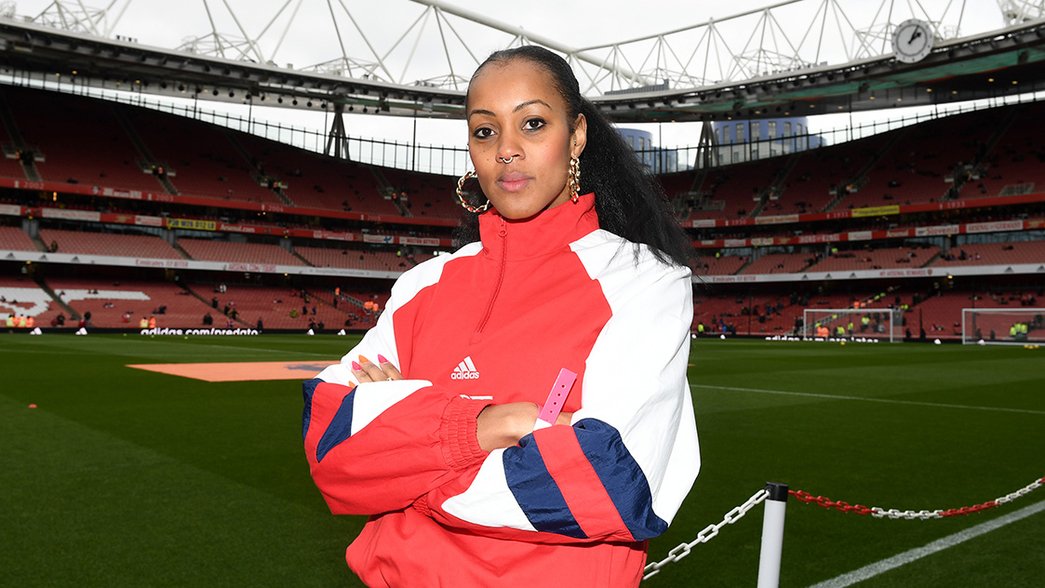Lou Jasmine has Arsenal in her blood. She grew up in a family full of Gooners in the days of Ian Wright and Tony Adams, with few visible woman and non-binary photographers or footballers to look up to. What a difference two decades make.
From filling family photo albums with shots from disposable cameras to photographing our squad for our Women’s Champions League campaign, Lou came full circle.
For Women’s History Month, we spoke to her about inclusivity, creativity and how Arsenal is more than a football club.
Tell us about how your connection to Arsenal began
It’s been from birth! I was born into an Arsenal family: my granddad, my granny, my cousins, my mum, my stepdad and my dad are huge Gooners. We’ve all loved the team, loved the club, through thick and thin and all the highs and the lows.
I remember getting my very first kit for my birthday when I was 10 years old - the red JVC shirt by Nike in the 90s. It’s a wicked shirt but it’s the collar, especially, that I love. I don't think I have the shorts anymore but I’ve still got the shirt and I still wear it!
When I was in primary school, I even made my own hand-drawn Arsenal magazine, cover to cover, with a word search and everything. I never got to go to a game at Highbury when I was younger but I would watch them all the time on TV. It would be a big family event. We'd all go over to my grandparents on a Sunday and watch it with all my cousins. So from childhood to now, being an Arsenal supporter has meant a considerable amount to my life.
What does the club mean to you off the pitch?
Community is the biggest thing that stands out for me compared to any other football club. Arsenal is so much more than a football club and it's always been like that. Even when I was a kid, even when I didn’t have the chance to go to games, I always felt like a part of the club. I’ll meet other Arsenal supporters, whether it’s here or abroad, and there’s this shared understanding and unity. We instantly feel like family.
I remember my first time at the Emirates all those years ago and I immediately felt: “This is my home.” Now I live in Highbury so I've been to quite a few matches, but it’s also the sense of community outside of the ground. What's amazing is that you see everyone in an Arsenal shirt: all ages, all genders. It’s beautiful! If you go into a coffee shop at the weekend, you can hear people talking about the game. Arsenal is so entrenched in this area and that’s so wonderful to live through.
What the club does to support inclusivity as well is incredible. At the end of the day, if we want to look at football on a wider social scale, community is what helps people not feel so isolated. When people don't feel isolated, it helps their mental health. People want to belong to something and Arsenal really reinforces that across the board. You can be whoever and still get to be part of this club in a big way. You still mean something.
Shooting our squad for the Women’s Champions League campaign must have been a dream come true?
Shooting the squad was a huge full-circle moment for me. For someone who loved and grew up with football but never really saw women in football, it was absolutely incredible.
I have a funny video from my boyfriend last night. We were coming through Highbury and Islington station and I spotted the Champions League ad on the video billboard. We chased after it and had to wait until it came back again to get a photo but literally, a dream come true.
When my boyfriend took a photo of me by the billboard, a little boy no older than six saw the billboard and shouted “look Dad, it’s Arsenal Women!” He stood by the billboard for a bit waiting for the photo to come back and the excitement and awe on his face was so beautiful. That’s the impact inclusivity is having.
The photoshoot was one thing - a really, really special moment as a fan - and then to see the product of that on my home turf was amazing. Arsenal Women are one of the most successful women's football teams in Britain and that was long before women's football was having the incredible moment that it’s having now. They’ve always been known as the club who were smashing it.
What’s it been like to see the progression of the women’s game in real time?
As someone who has always been into watching and playing sports, whether it’s football or athletics or basketball, it’s unbelievable. Even on the odd occasion that you’d see women's football on TV, it never felt like the coverage was good enough. The pitches didn't look very good. It was essentially treated as a second-rate sport.
It’s been incredible to see the development not just on a professional level but also in terms of inclusivity. It doesn’t feel like such a male-centric community or environment anymore. You see a lot more dads now kicking the ball with their daughters in a way that I never saw before. You see mums taking their daughters to games. It’s become like a family event and that is just so beautiful to see.
You even feel that when you’re inside the club and you're walking around the grounds. Looking at all the staff and everyone genuinely looks really happy to be working. Everyone's just beaming and buzzing around! It’s very heartwarming.
How did you find your way into photography?
Photography has always been there. My family would always have these stacks of photo albums and it was amazing to see my mom when she was younger and stuff like that. Even at an early age, I was so inspired by how candid everything looked and how you could get a beautiful feeling just from one photograph. So I went through disposable camera after disposable camera, taking pictures of my family and then, as I grew older, I got my own point-and-shoot.
I never really thought about becoming a photographer as a job. It never occurred to me that I could make a living from it, to be honest! I joined Instagram back in 2010 when it was basically a blog and as the app grew and developed and changed the way that we would view images, people started noticing the way I would take pictures. I had friends in music as well, so I’d take photos of them when they were playing and then more musicians would ask if I wanted to shoot their gig.
I was working in TV production at the time and I was really frustrated by the lack of opportunities for women, and black women in particular. The fact that no one would actually let me behind the camera is quite hilarious now! My desire to be creative but being constantly held back had quite a substantial effect on my mental health. So I just left. I left the industry, moved back in with my parents and just thought, “you know what, I can just try this photography thing. People are still asking me to take pictures - let's see if it works.” Six years later, here I am.
Photography is something that feels so instinctive to me. I’m at my happiest when I'm shooting, I’m having such a great time. It feels as easy as writing my name at times - I don't think about it. That doesn’t mean I don’t have the odd struggle with the technical side or avoid creativity blocks, but the act of picking up a camera is second nature. It unlocks a very deep part of me.
What does Women’s History Month mean to you?
Visibility is incredibly key. You can’t be what you can’t see: representation matters across the board. If you look at football and photography, both have been male-dominated industries for years, but the fact is now that women are banging down those doors.
It’s amazing because there are also men who are really helping and supporting that change. At the end of the day, it shouldn't be us versus them: it’s about unity, equality and cohesion. I’ve shot various films on inclusivity and representation - it means a huge deal to me.
Being a photographer can be a very lonely profession. I think creating a tribe of people who really understand you and understand your struggles is vital. Sometimes you’re aware that you are the only woman on set, so it’s great even to just see other woman and non-binary photographers in action.
There are so many incredible women and non-binary photographers who constantly inspire me. It’s been amazing to have people who look like me to look up to and to work alongside. Social media has been really key with that visibility and has allowed me to reach out to some of my fave artists and ask for advice and share experiences and assisted a few when I was starting out. It’s incredibly invaluable.
For anyone who's coming up in the industry and is unsure about their direction, I really do encourage them to reach out to people whose work they like and try to create a support network as well. It’s so important.
This International Women’s Day, I thought about all the women who inspired me creatively. Those aren't necessarily creatives themselves, but I wouldn't be where I am today without all the women in my life who inspire me continually.
We have come so far but I do continue to think very deeply about the safety of women in all areas. You can see progress in that women's football and women watching men’s football feels much safer now, but the general safety of women is still not there. I try and draw attention to how important that is in a creative way on my platform.
Copyright 2023 The Arsenal Football Club plc. Permission to use quotations from this article is granted subject to appropriate credit being given to www.arsenal.com as the source.












